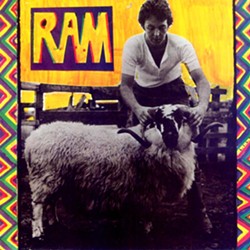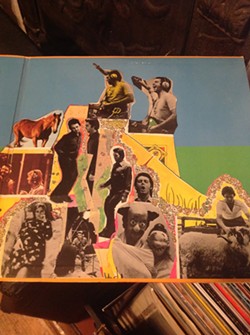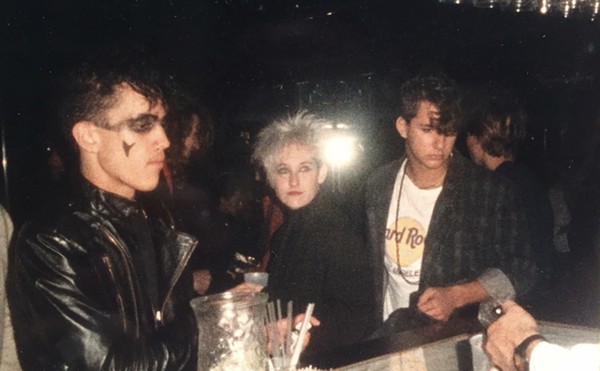As April 19 and Record Store Day draws near, we're proud to announce Turntable Tuesday, a new weekly column taking a look at an album in our collective staff library. Though we spend most of our time in the music section writing about new material, Turntable Tuesday allows us to look back, and look closely at some captivating albums in our catalog. More importantly, it gives us an excuse to keep buying those inky black LP's we love so much.
To kick off Turntable Tuesday, let's reach into an early instance in Paul McCartney's solo career, 1971's Ram. His second release after the Fall of the Beatles, Ram flashes brighter than its predecessor, 1970's McCartney, a direct and simple return to blues basics. In his second post-Beatles attempt, McCartney and then-wife Linda recorded an album of conjugal joy, oozing coital energy and pop experimentation.
With Paul leading the recording, unencumbered by the personal conflict and pressure cooker known as the late Beatles, Ram is truly a fun album, the work of a master composer and arranger playing with the sound and structure of his music up to that point. With John Lennon out of the mix, Ram showcases the instrument of personality that is Paul McCartney's voice. Ranging from the intimate and exposed "Ram On," to the vaudevillian play of "Monkberry Moon Delight," Paul's vocals drive the album through its wide range of styles.
https://www.youtube.com/watch?v=FSfmMj1rPe8
Now that Ram's language is engrained deep in my brain, I'm amazed by how inconsequential the lyrics are. With "Monkberry" and "Smile Away," McCartney treats his language as syllables to stick in the listeners' head, unconcerned with literary weight. Not to say that's its vapid, filler content. Rather, McCartney places emphasis on harmony and melody, blending his and Linda's voice into one.
Ram's liner art, as designed by Paul McCartney
Upon Ram's debut in May of 1971, the album was critically shat upon. Despite commercial success in the UK and US, critics panned the album as self-indulgent, weak and sprawling without the high-art editing of John Lennon. Playboy compared the record to "watching someone juggle five guitars: It's fairly impressive, but you keep wondering why he bothers."
Unlike Playboy, after forty-plus years, Ram retains its cultural weight. Ahead of its time, McCartney's second solo shot presages the playful, lush and homestyle orchestration of indie pop (just imagine Arcade Fire's Neighborhood suite or anything from Tame Impala without McCartney's influence). As the best album in the purgatory between the Beatles and the McCartney-led Wings, Ram realizes Paul's pop perfection at its most eclectic.


















